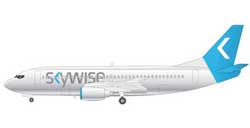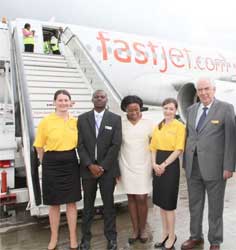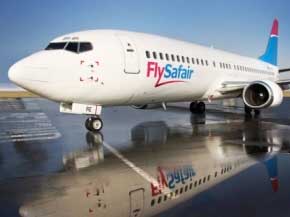
Top stories






AutomotiveHilux Custom Builds offers purpose-built solutions for your business
Toyota South Africa Motors 16 Feb 2026
More news

Marketing & Media
Ads are coming to AI. Does that really have to be such a bad thing?















The three would-be contenders are Skywise‚ FlySafair and 1time. The first two are new start-ups while the last is the popular and bankrupt low-cost carrier that is being resurrected by Pak Africa.
More unfinished business is that of Dar es Salaam-based fastjet in South Africa‚ with its plans to establish a low-cost domestic carrier here. The airline left South Africa in a hurry in July to focus on its international business flying out of its base in Tanzania.
Four new potential rivals to Mango and Kulula in a market that is becoming notoriously overtraded - the demise of airlines such as Nationwide‚ Velvet Sky and 1time spring to mind - speaks volumes about the risk appetite of the new entrants as well the pent-up demand from consumers for more affordable travel.
When 1time collapsed in November 2012‚ 2.5m seats of annual capacity were removed from the market - a gap that has not been taken up meaningfully by any of the incumbent operators.
Instead‚ prices have climbed. Some argue prices were driven by higher fuel costs and pricing corrections implyhing that seats have been too plentiful and too cheap.
One of the more interesting and potentially more successful entrants is Skywise. The new airline is being promoted by the founders of 1time. While 1time went bankrupt‚ the former management team had built a great brand and a strong business‚ with the best on-time performance and strong growth in passenger numbers every year until the oil price turned against it.

Its plan to deal with record fuel prices and the collapse in the market caused by the 2008 financial crisis never got off the ground. A new set of shareholders and directors‚ brought in with an empowerment deal supported by the Industrial Development Corporation‚ created a cocktail for conflict at a time when decisive action was needed to pull the airline out of its nosedive. Instead‚ the founding directors left‚ selling off their shares‚ and 1time failed about a year later.
The people who started 1time have learnt from the experience and will now work with more modern aircraft - much more fuel-efficient Boeing 737-300s as opposed to MD80s - and say they want to introduce other innovations to the domestic market.
More than a year in the planning and having received its licence‚ Skywise had expected to start flying before the end of the year to benefit from the holiday travel demand‚ but new civil aviation regulations slowed its progress. For months now‚ Skywise has been saying it is just a matter of time before it takes to the air.
Another contender is Pak Africa‚ which has had its eye on 1time for more than five years. It too had expected to be up and running by now but has also been hobbled by regulations. In this instance‚ because it is buying the former 1time Holdings company - the JSE-listed shell - it has had to fulfil a variety of conditions to comply with JSE listing requirements.
The solution was to acquire a 62% stake in Global Airways‚ an established South African charter and scheduled passenger service with an existing air operator's certificate.
Pak Africa‚ which is buying the 1time brand and listed shell for R15m‚ expects to be operating on all of South Africa's major routes by April and between Harare‚ Johannesburg and Polokwane.
The latest newcomer is FlySafair. It has been a bumpy start for the carrier that advertised widely for cheap flights between Johannesburg and Cape Town‚ selling almost 2‚000 seats before it was prevented from flying by a court order.

The airline‚ which is using former Imperial Holdings-held Safair's infrastructure and experience‚ has had to reapply to the Air Services Licensing Council for a scheduled passenger service licence after Comair and Skywise successfully interdicted it from starting operations in October.
FlySafair did not meet the restrictions on foreign ownership‚ according to the judgment from the court proceedings. The airline concluded a black economic empowerment deal in December and changed some of its directors‚ and has now reapplied for a licence in the hope that its new structure will meet the 25% limit on foreign control of a domestic scheduled service licence.
But success for FlySafair remains uncertain as Comair has again lodged an objection to its renewed licence application. The outcome will only be known in the coming months.
For the third would-be entrant‚ Dar es Salaam-based fastjet‚ more than a year has passed since it first said it was stepping in to take on the debt-riddled 1time in time to fly customers left stranded by the airline's sudden closure before the end of the 2012 holiday season.
Then‚ in March‚ fastjet abandoned this plan‚ stating that 1time's debt of R450m was too high and it could not reach a compromise with the troubled airline's creditors.

A month later a deal was announced with Edward Zuma‚ the son of President Jacob Zuma‚ to ensure it met local ownership requirements. This ownership structure was challenged by Comair‚ and fastjet refused to discuss the shareholders in the local venture and became defensive when questions were asked about the financial arrangements‚ as it was suggested local shareholders could be fronting.
A July start date for a fastjet service between Johannesburg and Cape Town was set. But this was hastily abandoned‚ perhaps fortuitously as opposition was mounting over its air service licence when Tanzania's government delivered long-awaited bilateral rights to four African countries.
Fastjet left its South African plans in limbo to focus on its launch of the route between Johannesburg and Dar es Salaam. However‚ the company has been clear that any serious pan-African low-cost carrier‚ which is what it wants to become‚ cannot operate without a presence in South Africa.
Apart from as many as four new entrants into privately owned‚ low-cost market in 2014‚ it will also be an action-packed year for state-operated carriers. Not only is South African Airways (SAA) and its sister operator and regional carrier SA Express likely to face increased competition from the new entrants‚ but they will also have to elaborate more fully on their plans to return to a more sustainable financial footing.
The slow-burning battle between SA Express and SA Airlink will heat up as the state-owned airline is likely to move further into routes historically operated‚ by agreement‚ by SA Airlink.
SA Airlink has long had a code-share agreement in place with SAA‚ which also holds about 3% of its stock. No one is calling it a fight yet‚ but in a few months consumers are likely to see prices falling on the routes these two carriers operate - primarily secondary ones such as Bloemfontein‚ Richards Bay and Pietermaritzburg.
For SAA‚ as it enters the second year of its turnaround strategy‚ which has yet to be fully shared publicly‚ there will be more clarity on its new fleet requirements and financial position.
Howls of protest and the habitual calls for privatisation will dominate social media platforms and the letters pages of newspapers when the bail-out of the airline is announced. It is going to be billions and billions big.
The enlarged regional role that has been described in brief detail for Mango‚ the low-cost subsidiary of SAA‚ should begin to be implemented more visibly. This could create an increasingly interesting dynamic between it and fastjet.
The showdown between Comair and the Department of Public Enterprises and the Treasury is set to play out in 2014. The case brought by the Kulula operator to challenge the legality of the state's financial support for SAA will go to court in the first half of the year‚ possibly as early as April.
Other legal battles may also proceed in the new year‚ such as the challenge brought by axed SAA acting chief executive Vuyisile Kona in a bid to restore his professional reputation. Despite being handpicked for the job by Public Enterprises Minister Malusi Gigaba‚ he was removed‚ and he wants the court to review the minister's decision.

For more than two decades, I-Net Bridge has been one of South Africa’s preferred electronic providers of innovative solutions, data of the highest calibre, reliable platforms and excellent supporting systems. Our products include workstations, web applications and data feeds packaged with in-depth news and powerful analytical tools empowering clients to make meaningful decisions.
We pride ourselves on our wide variety of in-house skills, encompassing multiple platforms and applications. These skills enable us to not only function as a first class facility, but also design, implement and support all our client needs at a level that confirms I-Net Bridge a leader in its field.
Go to: http://www.inet.co.za